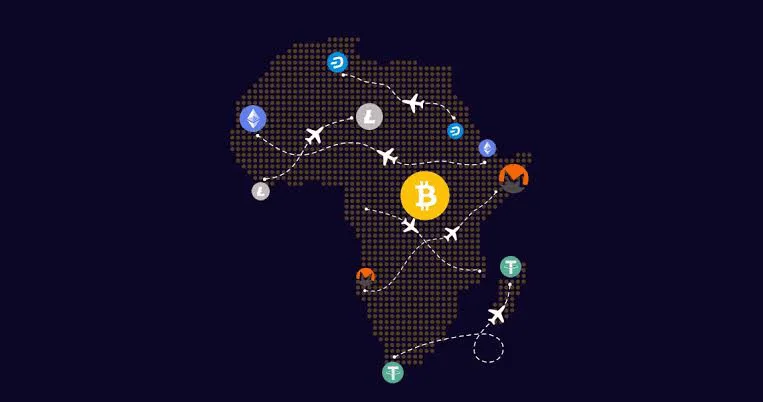Africa has been widely touted as one of the fastest-growing markets for crypto adoption over the last year.

A new analysis from blockchain research and analytics firm Chainalysis provides insight into how quickly the market is growing.
Over the last year, the African crypto market has risen by more than 1,200 percent in terms of value received.
According to Chainalysis, African countries acquired approximately $105.6 billion in bitcoin between July 2020 and June 2021.
However, Africa has the lowest crypto economy of all the locations studied by the research firm.
The report features four big crypto trends in Africa, including:
- Growth in grassroots adoption
- Increasing popularity of peer-to-peer (P2P) Platforms
- Crypto-based remittances
- Crypto as a tool for wealth preservation
Grassroots Adoption
Despite its modest crypto economy, Africa has some of the highest grassroots adoptions in the world, according to Chainalysis, with Kenya, Nigeria, South Africa, and Tanzania all ranked in the top 20 of its Global Crypto Adoption Index.
One technique to gauge grassroots adoption is to look at the proportion of a region’s total transaction volume that consists of retail-sized transactions.
According to Chainalysis data, that proportion for Africa is slightly over 7%, which is higher than the global average of 5.5 percent.
Top African countries by Grassroots adoption
- Kenya
- Uganda
- South Africa
- Tanzania
- Nigeria
- Central African Republic
- Ethiopia
- Cameroon
- Zimbabwe
- Egypt
- Botswana
- Rwanda
P2P Platforms Are Getting More Popular
While P2P volumes represent a minor portion of total African transaction volume (2.6 percent for bitcoin and 1.6 percent for all cryptocurrencies), no other region uses P2P services at a higher rate than African crypto consumers, according to Chainalysis.
The fact that the governments of Nigeria and Kenya, two of the leading African countries in terms of crypto adoption, have made it difficult for crypto enterprises (such as exchanges) to operate with banks is the major reason for this trend.
Nigeria’s central bank sent a circular to the country’s banks in January, noting that licensed financial institutions are prohibited from dealing in cryptocurrencies or enabling payments for cryptocurrency exchanges.
The Central Bank of Nigeria’s anti-bitcoin move came about three months after the viral End SARS protest, in which Nigerian youth demanded that their government intervenes in police brutality in the country.
After Nigerian banks restricted the accounts linked with the demonstration, Bitcoin, among other cryptocurrencies, played a big role in funding the movement.
Kenya’s central bank cautioned banks not to deal with cryptocurrency or facilitate transactions for crypto-related companies in 2018.
On June 4, 2018, the local bitcoin blog BitcionKE reported that some Kenyan banks have begun sending warning emails to consumers who had previously transacted in cryptocurrency using their debit or credit card.
As a result, it is not surprising that people of these two countries are resorting to P2P platforms that do not directly support transactions.
Top African countries on P2P Exchanges
- Nigeria
- Kenya
- South Africa
- Tanzania
- Uganda
Crypto-based Remittances
Between July 2019 and June 2020, Africa received the highest cross-region value of any region studied by Chainalysis. This could imply that more Africans are getting remittances via cryptocurrency.
Chainalysis also cited the monthly growth of cryptocurrency payments under $1,000 (both in volume and in transaction count) as a possible indicator of an increase in crypto-based remittances to Africa.
The analysis organization believes that $1,000 is the upper limit of expected remittances sent to the continent.
According to a Brookings Institute study, Sub-Saharan Africa received an estimated $48 billion in remittances in 2019, over half of which went to Nigeria.
Furthermore, according to World Bank remittance data, Sub-Saharan Africa is the most expensive location for sending money. Bitcoin, and cryptocurrencies in general, have long been hailed as aiding in the reduction of the speed and cost of remittances.
Wealth Preservation & Investments
Currency risk is at an all-time high in several African countries. For example, Nigeria’s central bank has devalued the Naira, the country’s currency, by almost 35% during the last five years.
Constant devaluation erodes Nigerians’ wealth in a country that consumes more imported commodities than it exports (excluding crude oil).
According to Artur Schaback, chief operating officer and co-founder of P2P exchange Paxful, the exchange’s growth in Nigeria have increased over the last year due to currency depreciation.
The researchers’ data corroborated Schabacks’ assumption, with P2P volumes typically increasing after currency depreciation in both Nigeria and Kenya.
